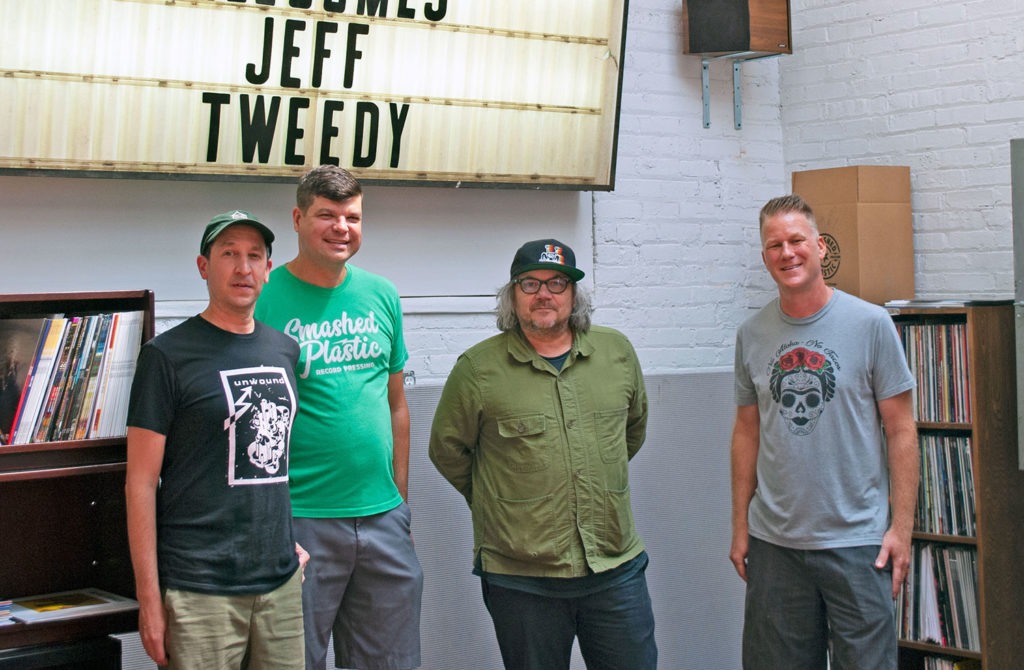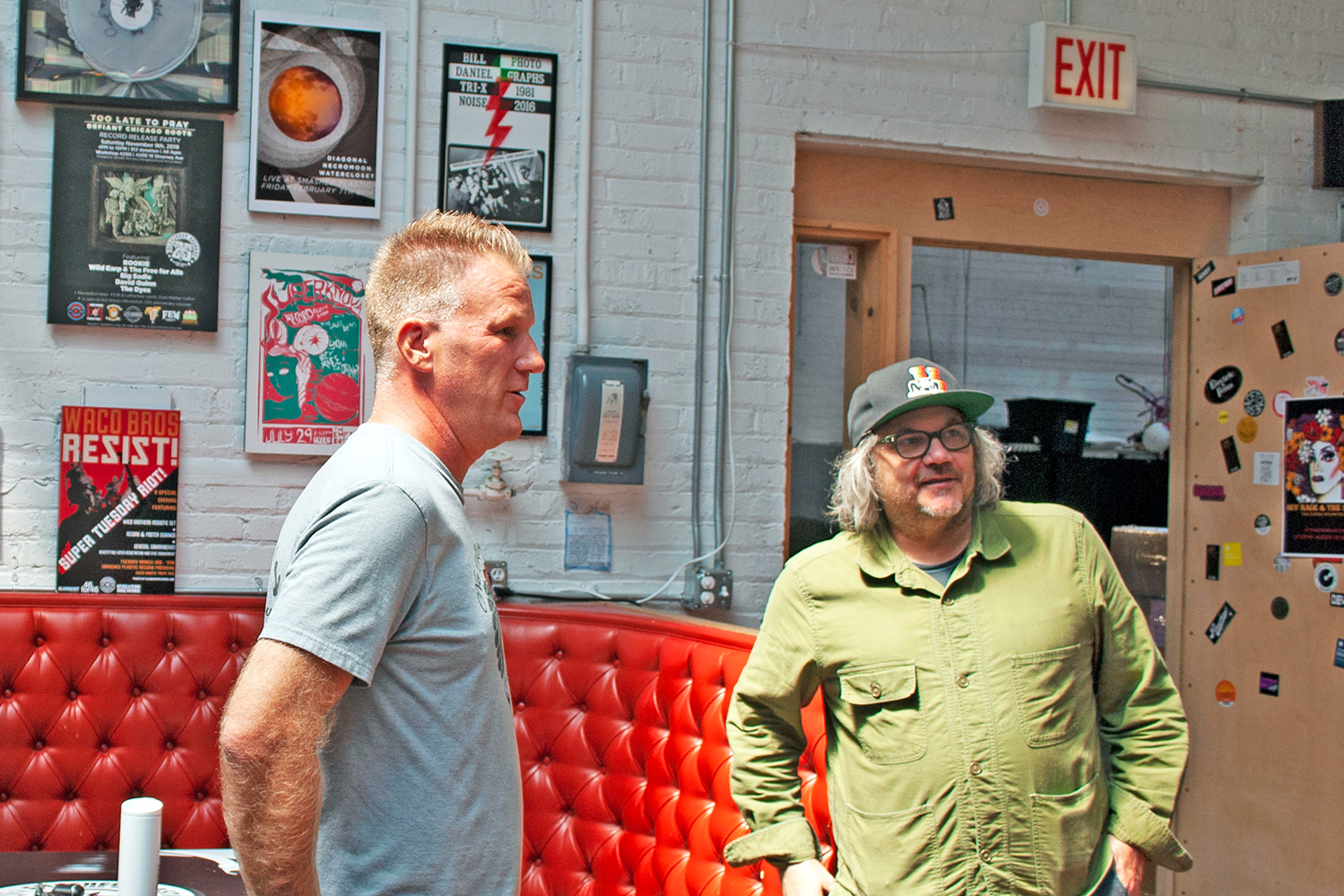In the fall of 2019, Andy Weber and the three other co-founders of Smashed Plastic, Chicago’s local record pressing plant, arrived at the glitzy Chicago Theatre to meet with Jeff Tweedy, guitarist and frontman of the band Wilco. Arguably the most successful band in Chicago, Wilco has produced twelve studio albums since 1994. Their music has resonated with listeners across decades, shown by the number of albums sold, plays on streaming platforms, and ticket sales for their live performances.
Smashed Plastic, on the other hand, had only begun pressing records a year earlier, using just one elephant-sized pressing machine to mint vinyl for local musicians and labels.
The Smashed Plastic team had just 15 minutes with the famous rockstar before Tweedy performed to a sold-out crowd. His manager had made the initial contact with Weber to say Tweedy was interested in getting involved with the plant. Having the ultimate Chicago-based musician’s support fit perfectly into Smashed Plastic’s local clientele, so Weber came with a proposal for Wilco to fund a second pressing machine — doubling the plant’s capacity to serve local artists.
“At that point, it was us pitching who we were,” Weber recalls. “I just remember rambling on and on and telling him the story of how we came together. I’ve been a Wilco fan since the first record, so I was like, “Wow, this is Jeff Tweedy sitting right across from me. My life has taken an interesting turn.” Prior to starting the new venture, Weber had been a part-time stay-at-home dad, part-time real estate agent, and lifelong music lover. At one time, he worked as a DJ on CHIRP Radio.
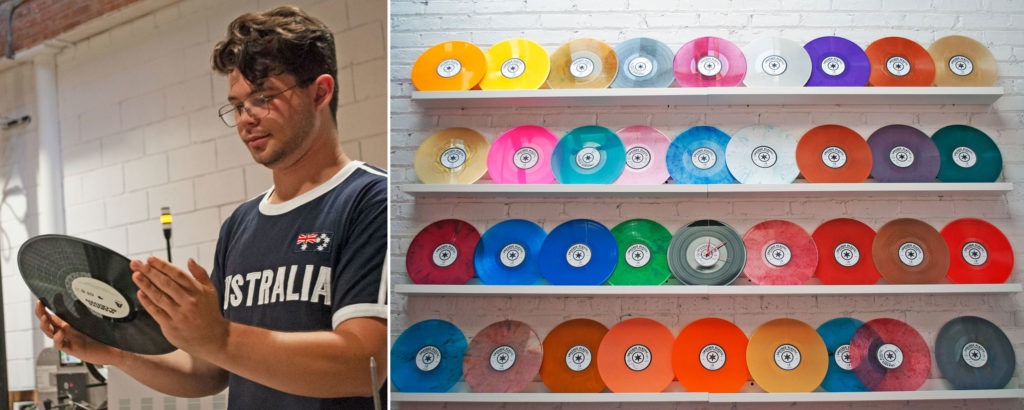
The short meeting was enough to capture Tweedy’s interest, but a few months later the pandemic paused the conversations. Wilco’s main revenue stream — touring — temporarily dried up. Meanwhile, Smashed Plastic’s business took off. The pandemic accelerated the “vinyl revival” of the last decade as young people looked for ways to enjoy time at home while supporting their favorite artists. By 2021, vinyl record sales surpassed 40 million — an exponential rise from around 2 million in the early 1990s when cassette tapes and CDs took over the market. Smashed Plastic went ahead and bought the second machine on their own, agreeing to stay in touch with Tweedy for another opportunity.
Now, three years later, Smashed Plastic has cemented itself as a fixture in Chicago’s indie music scene. Of its sixteen employees, many are members of local bands. The plant’s city location — they’re in the Hermosa neighborhood — also means more frequent and deeper relationships with artists.
“I live nearby and I can go pick up my records and get on tour,” says Ben Baker Billington, a Chicago-based musician. “It’s all familial and community-based. I love having them in the city. It creates pride.” P. Michael Grego, another local musician, filmed a live set at Smashed Plastic with his band ONO. He described the plant as having “that Willy Wonka factory wonderment.”
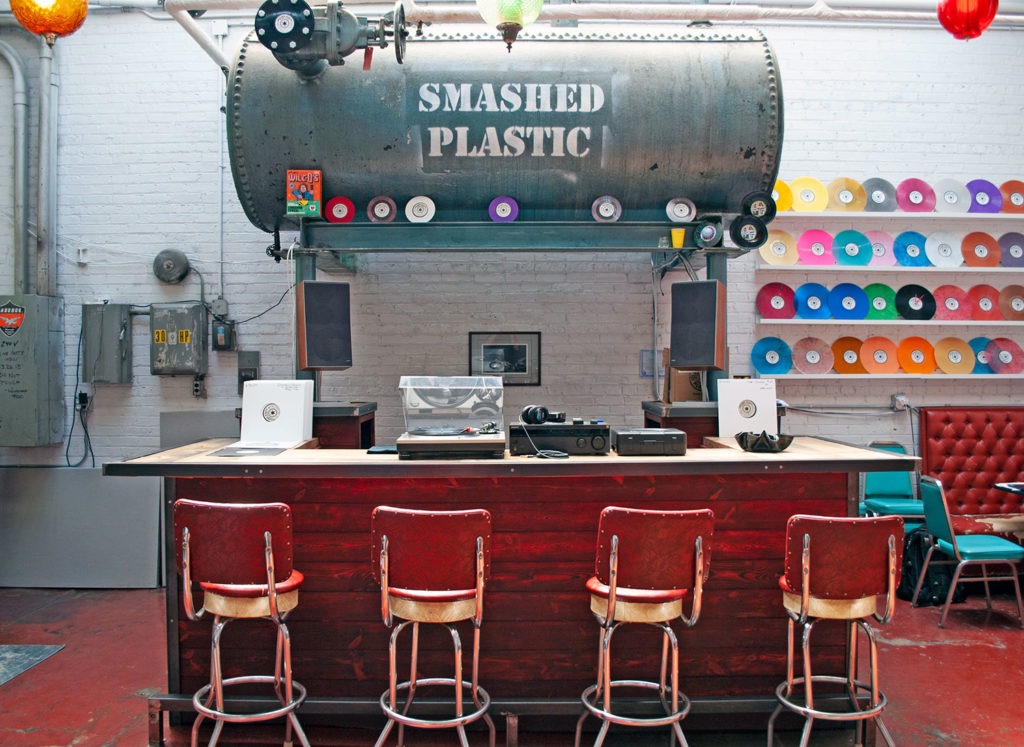
Smashed Plastic is one of thirty businesses in a co-working space called Workshop 4200, the home of the old Hammond Organ factory. They share the building with coffee roasters, candlemakers, printing presses, distilleries, and more. “Vinyl is a luxury item,” Weber says, referring to its relatively high price point compared with streaming platforms. “We’re kind of like a craft brewery or artisan coffee roastery, so we fit right in.”
The entrance to Smashed Plastic is down a long hallway, where a large, blonde wooden door with the Smashed Plastic logo on it opens right onto the factory floor. Two record pressing machines constantly hiss and whir, producing runs of 250 to 20,000 records.
But in the past few years, crippling supply chain shortages have strained capacity and bottlenecked production. Basic supplies can take months to procure, from the plastic that melts down to form the record to the thick, glossy paper jacket the finished product goes in. It now takes eight months to complete an order, up from three months in the early days — a delay that’s average across the industry. Weber’s current goal is to get to six.
On top of supply issues, only one manufacturer in North America — Toronto-based Viryl Technologies — makes pressing machines, including both of Smashed Plastic’s. Since the pandemic, getting replacement parts and completing maintenance projects takes weeks instead of days. Smashed Plastic has a constant revenue stream, but almost all of it goes back into equipment and infrastructure upgrades.
After years of struggling with shortages and machinery issues, Smashed Plastic has recently come across a stroke of hard-earned luck: Jeff Tweedy of Wilco has come back to the table with an agreement to buy a third machine, the details of which are private. The partnership is a win-win-win: It accelerates growth for Smashed Plastic, records for Chicago musicians, and Wilco’s own vinyl runs. The new machine will increase the size of the total production pie enough to support Wilco’s larger orders of 30,000 or more while leaving space for other bands.
“I’ve loved records my whole life,” Tweedy says. “I feel fortunate every day that I get to spend so much of my time making records. But until now I’ve never had the opportunity to participate much in the actual manufacturing side of record making. Smashed Plastic is a great local, independent company that I’m thrilled to be able to partner with, following in a long tradition of Wilco, The Loft, and the Tweedy Family supporting and participating in the Chicago music scene.”
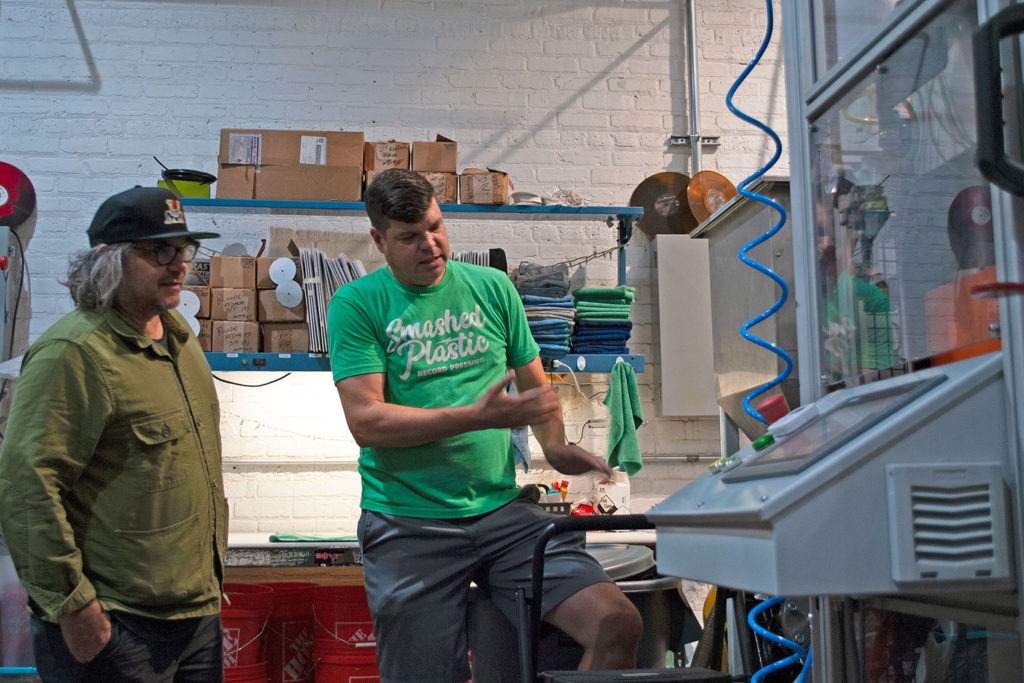
The machine will be delivered in early 2023 — hopefully. Viryl has not committed to a specific date as they battle their own shortages on parts, including microchips which are in such short global supply that the U.S. Government has passed a bill to bolster domestic chip production.
As Weber waits for the machine to arrive, the delays wear on him. He spends his days communicating new schedules to clients and solving production issues like a game of Whac-A-Mole. On one visit to the plant, the problem du jour was a broken thermal unit (a mobile, economical replacement for a full boiler room). Without it, one of the presses sat idle — a loss of 250 records per day. Weber anxiously checked his phone to see if Dave, a friend and pipefitter, had arrived to fix it.
“This has been 20 times harder than I thought it would be,” Weber says. “I had a real bad bout of anxiety back in September since we were so backed up. But I just remind myself I’m running a pressing plant and that’s a cool job.” Amid it all, Weber maintains a relaxed appearance, with a smile that’s quick to show itself in conversation.
Behind the scenes, Weber leans on meditation and therapy to manage the stress. He makes it a point to be open about his mental health with his kids and his co-workers at Smashed Plastic. “Meditation saved my life,” he says proudly.
In the past few years, he’s made a lot of progress in keeping an even keel — but the finicky machines have been a multi-year battle. “I need a vacation,” Weber says. “I always need a vacation.” But the joy of working with local bands and labels, he says, keeps them going.
“When you get away from the mire and the muck of the daily routine that drives you crazy and you start to look at the overall picture and the positivity of it, and you think to yourself, ‘There’s so much good happening.’”
As the plant grows in size, number of presses, and volume of orders, so does its contribution to the local music scene and the people who make it happen. Weber makes a point to work directly with clients. If any issues arise, he invites them to the building to troubleshoot it in person, rather than via email. “There will always be someone who can do it cheaper somewhere else,” Weber says. “But people use a local manufacturer because they believe in it. They’re supporting us and we are supporting them.”
Jordan Reyes, is a local musician who also owns the record label American Dreams, fondly remembers picking up the first vinyl records of his own music at Smashed Plastic. Twenty-eight years old at the time (he’s 31 now), he pulled up to the building and went inside to meet Weber. His album, Close, was playing on the turntable in the lounge. The two loaded up the trunk of his Ford Explorer with nine boxes filled with 500 ready-to-sell records complete with custom jacket art that he ordered three months prior.
“It was the first time that I had been to a pressing plant, and the first time I had pressed something of my own on vinyl, which was a moment of actualization as a musician,” Reyes says. “I had this feeling where I was like, “this is what I want to do for the rest of my life.” Reyes, like many other artists and listeners, is drawn to the warm quality of sound unique to vinyl. Since then, Reyes has pressed 40 albums with Smashed Plastic for his label.
Weber can often be found sitting between the pressing and assembly rooms, working through his emails in a retro-chic lounge area. A sign on the back wall reads: SMASHED PLASTIC WELCOMES YOU with a row of lightbulbs in the shape of an arrow on top. On one side of the room, old arcade machines, a beige vintage jukebox, and a brown leather couch create a retro living room. A large bar takes center stage.
All the ingredients are there for a great party space, including a turntable sitting on top of the bar, spinning the album the machine is currently pressing. But on this summer morning, sun streams in from above through an open skylight and Weber is working on coordinating Smashed Plastic’s first music festival this October. The one-day event will feature all local musicians at an affordable ticket price. The lineup includes Pixel Grip, ONO, Tar, Rookie, and Serengeti. Weber hopes it will be the first year of an annual fest.
“Everybody is local, and everybody has pressed with us,” Weber says. “It’s a festival for local music lovers. It’s going to be all the local labels selling their stuff, and local bands playing, and local beers, local food trucks.
“Keepin’ it all Chicago.”
